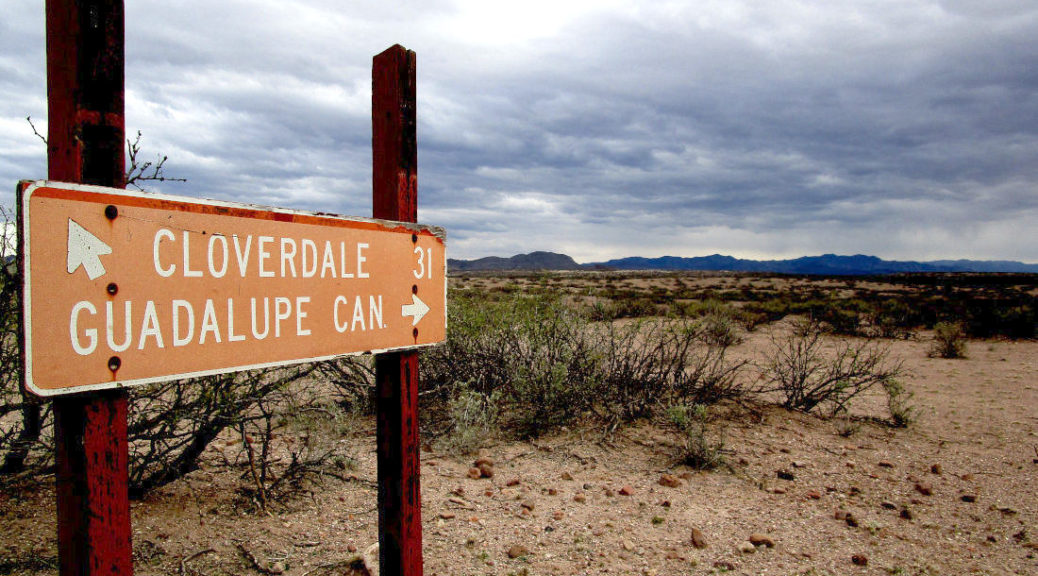It’s noon during an Arizona July, the temperature upward of 115 degrees, and I’m in the middle of my shift at a neighborhood bar off I-10 in Marana, just north of Tucson. The screen door bangs, startling me. I look up from behind the counter, where I’m putting beers on ice, and see a man wearing cowboy boots, dirt-stained jeans, and a striped blue-and-white dress shirt. “Sorry!” he blurts out in Spanish—he hadn’t known the door would slam so violently behind him. Sweat is pouring down his face, running into his eyes.
Right away I know that he has been crossing the desert. I hand him napkins to wipe away the sweat and motion for him to head over to the bar. He settles onto a stool where he can easily catch the breeze from the fans and swamp cooler.
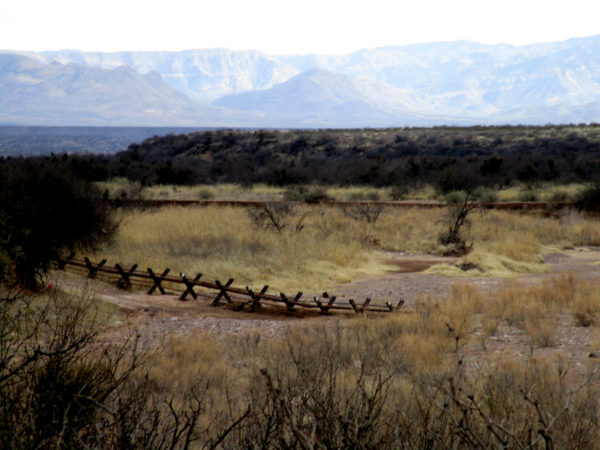
I throw some money in the register and bring him a couple bags of potato chips, along with a pitcher of ice water. The visitor digs into the chips while making his way to a small table tucked between the pool tables and the jukebox. I root around in the cooler for a soft drink to balance out the water and salty snacks.
We don’t talk. I let him sit there, regaining his strength. I know that the hottest part of the day is just starting.
After a while, the regulars begin to show up at the bar. Construction workers and landscapers, farmers and ranchers and miners—most of them started their day at three or four in the morning, and are ending it now with a cold beer. It’s too scorching to work any longer. As they walk into the bar, some of the regulars nod at the visitor. They know he is a crosser, but no one cares. They are exhausted from working. No one says anything when the man gets up from his table and heads back out into the desert.
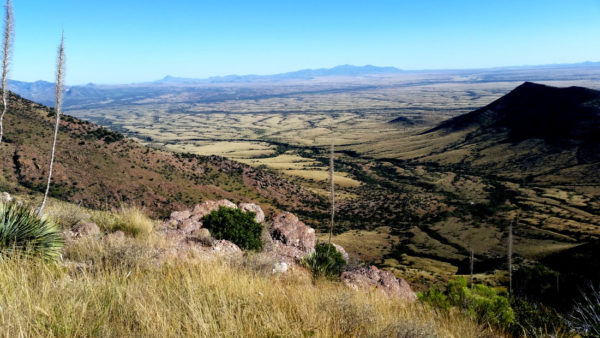
In addition to working shifts at the bar that summer three years ago, I was also working for a branch of the US military that was involved with border missions. Though we sometimes detained unauthorized migrants, our work was focused on terrorism, narcotics, and human trafficking—the real border issues. President Trump may energize his supporters by railing against illegal immigration, but what I saw in southern Arizona was that the drug trade dwarfs everything else. That summer, there was so much activity that all our resources were devoted just to making large busts—ones with a chance of major cash and drug seizures.
During the brutally hot summer months, border agents morph into search-and-rescue teams. When weather permits, the agencies involved in border operations will actually fly day patrols to look for border crossers faltering in the desert. They are picked up by ground crews, fed and given water, and taken back to the border. (Those caught with significant quantities of drugs, of course, are detained.) I can say without a doubt that my colleagues and I cared about what happened to those we found in the desert. We all personally knew how intense the heat could be—we had to endure it, too, in uniforms and body armor. A daytime crossing could easily turn lethal, and we didn’t wish such a fate on anyone.
I left the military two years ago and moved to the southeastern part of the state, right on the border. From here, I can stand on my roof and look into Mexico two miles to the south. On my side is the port town of Douglas, Arizona. On the other side is Agua Prieta, Mexico. Really, the two communities are a single town with a wall running through it. People have long been able to pass easily and frequently through this border crossing, and since Trump became president, that hasn’t changed. Children from Agua Prieta walk into Douglas to attend school, and families can stroll up to Walmart (the only real shopping option in a forty-mile radius) and pay with pesos at KFC and Taco Bell.
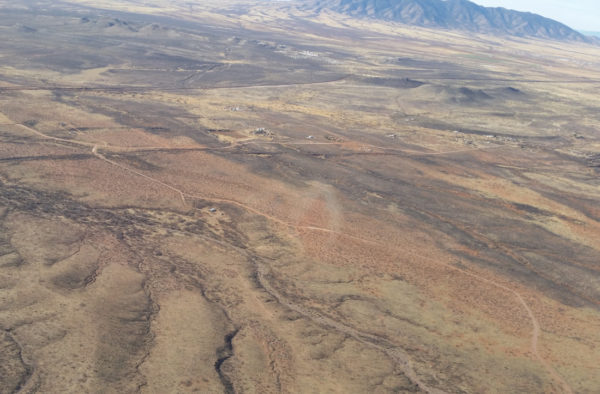
The Trump administration has hyped its plans to build a border wall, but there are already walls running through the populated areas along the existing border. They peter out into stick fences when you get to the open desert. Some segments of the fencing are completely deteriorated. But even if they were standing, they wouldn’t do much to impede the rampant drug smuggling, which consumes the border patrol’s resources. A minimal amount of research will tell you that tunneling is a popular system for transporting drugs. An effective wall would not just have to be high—it would also have to run deep into the ground. And even if you built such a wall, the drug cartels are always a step ahead. Some traffickers in this area have already taken to catapulting drugs over the fences. It’s clear to many of us who live along the border that building a wall would be a colossal waste of money—if dealing with illegal entry is the goal.
Crossing the border means crossing the vast Sonoran Desert. There are cacti, rattlesnakes, javelinas, roadrunners, coyotes, and bears. And there are jails. What there are not are jobs—real industry, actual manufacturing. The small-scale farming in southern Arizona doesn’t employ many people. This stretch of the border lies in isolated desert with nothing around in a hundred-mile radius. I think about all the businesses that are shuttering in places like Douglas, Agua Prieta, Nogales, Sasabe, Ajo, and Yuma. Families can’t make ends meet. Adults search for work elsewhere, often having to leave their kids behind. Sasabe, Ajo, and Naco have already dwindled to nothing but desolate border stations on the US side. Douglas and Agua Prieta have managed to stay populated—largely thanks to the presence of Walmart.
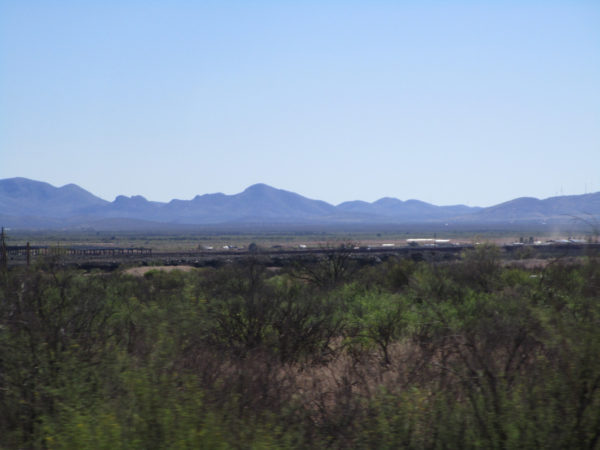
Meanwhile, the federal government is relying more on local agencies to catch drug smugglers. That has put further strains on these communities, forcing some to appeal for charity. In Cochise County, for instance, the sheriff’s department got a foundation to pay for a new helicopter.
Would building a wall resuscitate these dying local economies? The residents on both sides of the border would certainly benefit—whether they are directly involved in the building of it, or serving those who do. A construction project this large and long-term would finally mean a reliable source of income for the people who live here. It could be bipartisan, too. With the Republicans in control, we’d get paid to erect the wall. And when the Democrats take power, we’d get paid to demolish it.
Anna Chan Anna Chan is a writer based in Florida.
- Follow us on Twitter: @inthefray
- Comment on stories or like us on Facebook
- Subscribe to our free email newsletter
- Send us your writing, photography, or artwork
- Republish our Creative Commons-licensed content

